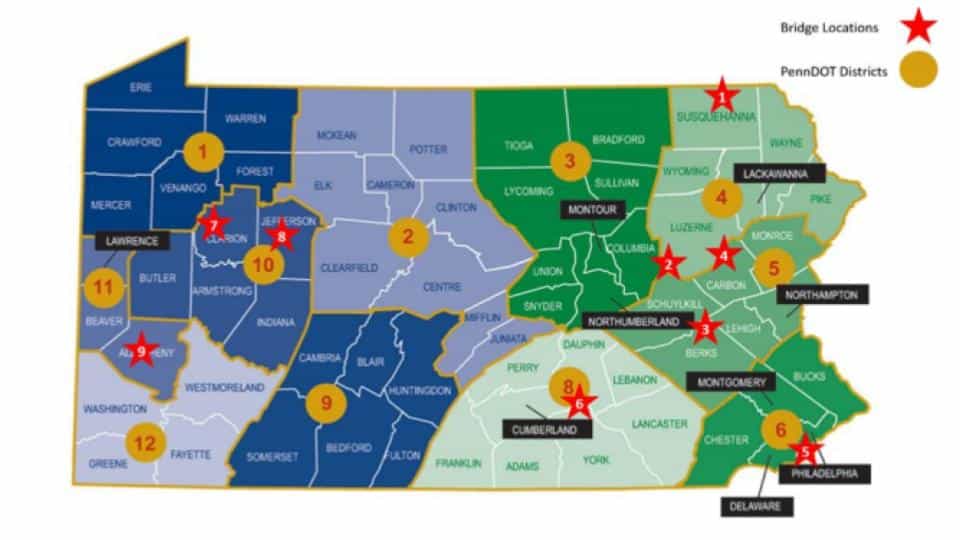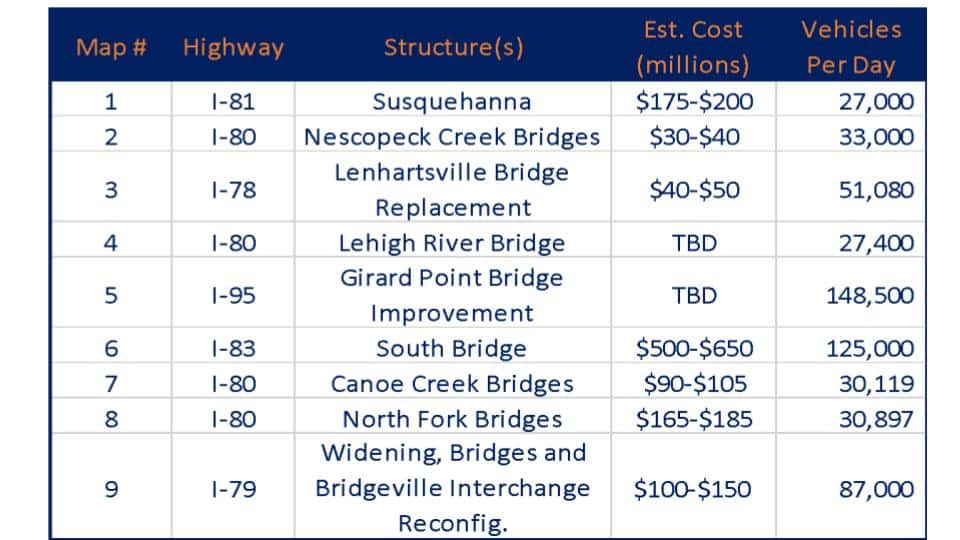In this issue:
MAIN ARTICLES:
- GOVERNMENT FINANCE: Unprecedented OPEB Survey Reveals $1.2 Trillion Shortfall, Government Revenue Numbers Exceed Expectations
- FEDERAL: P3s Need Place in Infrastructure Bill, Biden’s Bad Private Prison Ban
NEWS & NOTES:
- TRANSPORTATION: Maryland Selects Partner for DC-area Toll P3, Pennsylvania Releases Bridge P3 Project List
- LEGISLATION: Mississippi Privatization Bills Advance, Idaho Bill Looks to Establish Consistency With Agency Figures
- LOCAL GOVERNMENT: Council of Mayors Releases Partnership Report, Maine Towns Eye Partnerships for Homelessness, Repurposing of Municipal Buildings
- WATER: Baltimore Avoids Water Meter Privatization, Kentucky Town Seeks Wastewater P3
- SOLID WASTE: Chicago Recycling Contracting Decisions, Tampa Anticipates Waste Processing P3
- CORRECTIONS: Alabama Enters $3 billion Private Prison Leases, NM Officials Cite Importance of Private Prisons
- PARKS: Private Lease P3 Possible for Seattle-area Park, NYC Seeks Partner for Central Park Attraction
- FEDERAL: Army Corps Flood Management P3 Granted Permits, Department of Energy Seeks P3 for Lunar Nuclear Energy
MAIN ARTICLES
New Report Finds $1.2 Trillion in Unfunded OPEB Liabilities
As state and local governments grapple with financing their public pension systems, fully funding other post-employment benefits (OPEBs), which include public worker health care benefits and other non-pension retiree benefits, is also a major problem for many governments. In a new study, Reason Foundation’s Marc Joffe presents the depth and scope of the problem — $1.2 trillion in unfunded liabilities — by reviewing over 30,000 audited financial statements. Exploring OPEB liabilities on per capita and revenue ratio terms, he finds a variety of outcomes for government agencies but a significant portion of the total net liabilities is mostly concentrated in a few states and locales, especially New York.
Early State Revenue Figures Exceed Expectations
While the COVID-19 pandemic has decimated private sector activity in many industries, early figures suggest less dire state government revenue losses than originally feared. In a post that is being updated with new figures as they become available, Reason Foundation’s Marc Joffe finds many states are exceeding tax revenue expectations compared to forecasts made at various points during the pandemic. There is currently just a .1 percent decline in total state tax revenues compared to 2019, with some states exceeding expectations but others experiencing double-digit revenue losses.
Federal Infrastructure Bill Needs Place for P3s
Despite partisanship and the hostile political divide on Capitol Hill, both major political parties say they want to rebuild and replace the nation’s critical infrastructure. In a recent article, Reason Foundation’s Robert Poole explains why using more public-private partnerships (P3s) for large projects should be a major component of any future infrastructure bill: “(I)nfrastructure investment funds have raised over $600 billion in the last five years, nearly all of it planned for equity investment. If projects are financed with 25 percent equity and 75 percent debt, that $600 billion could finance $2.4 trillion of brownfield refurbishment and greenfield projects,” Poole writes.
Biden’s Proposed Private Prison Ban Imperils Potential Improvements
The Biden administration’s executive order announcing the eventual end of the use of private prisons by the federal Bureau of Prisons should come as no surprise to those who followed the outgoing Obama administration’s attempt to do the same five years ago. It should also come as no surprise that the new executive order contains the same misguided thinking. In a recent article, Reason’s Austill Stuart revisits the 2016 Inspector General report used by the Obama administration, and now Biden administration, to justify their respective bans. Stuart debunks wrong-headed comparisons of public and private prison quality and highlights how ending private prison contracts may disrupt attempts to improve educational, therapeutic, and vocational opportunities for inmates behind bars, as well as the development of private programs that reduce post-release recidivism.
NEWS and NOTES
TRANSPORTATION
Maryland Chooses Transurban-Macquarie Consortium for DC Beltway P3: In February, the Maryland Department of Transportation announced its selection for Phase I of its $7.6 billion Capital Beltway P3 project. Accelerate Maryland Partners LLC, a consortium comprising equity providers Transurban and Macquarie, along with Archer Western Construction, Dewberry Architects, and Stantec, will add high-occupancy toll (HOT) lanes to Interstate 270 in a 50-year toll concession. Phases II and III will include the addition of HOT lanes to Interstate 495.
PennDOT Releases List for Major Bridge Replacement P3, Issues RFI: The Pennsylvania DOT announced a pair of developments related to its Major Bridge Replacement and Rehabilitation Program P3 in February. After revealing a list of nine structures under consideration of the project (see map and the list below), PennDOT also released a Request for Information (RFI) for the project, hoping to shortlist potential partners and lease a Request for Proposal (RFP) in Fall 2021. PennDOT seeks to use tolling to help fund replacing and refurbishing busy interstate crossings, as the agency reports an annual funding gap of $8.1 billion for its highways and bridges.
Source: Pennsylvania Department of Transportation
LEGISLATION
Pair of Mississippi Privatization Bills Advance in State Legislature: The Mississippi Legislature has advanced a pair of bills that aim to privatize government functions. House Bill 997 would remove the state’s Department of Revenue as the sole liquor wholesaler and distributor, setting up a process that permits and regulates private entities to fill the functions. After passing the House earlier this month, it has been referred to the Senate Finance Committee.
The second piece of legislation, Senate Bill 2486, commissions a study to look at a variety of alternative arrangements’ feasibility to manage and operate state parks, including transferring them to local governments or private entities. The bill awaits action in the House after passing the Senate in early February.
Idaho Advances Bill to Create Uniform Local Government Accounting System: Idaho lawmakers advanced House Bill 73, which would establish a uniform system for the state’s local governments and school districts to report their financial data. The legislation prompts the state controller to create a comprehensive manual of standards for local agencies to adopt in reporting their figures to the state controller and transfers registration recordkeeping from the legislature to the controller’s office.
LOCAL GOVERNMENT
Maryland School District P3 Reaches Financial Close: In January, the school district of Prince George’s County, Maryland, reached financial close with Prince George’s County Community and Education Partners—a consortium of FenGate Asset Management, Gilbane Building, Stantec, and Honeywell—a press release noted. The 30-year design, build, finance, and maintenance P3 calls for delivering six new schools. Accelerated construction and cost savings made the project attractive to the school district, which cited a $180 million savings over a traditional design-build-bid approach. These critically-needed savings are expected to fund the estimated $8.5 billion needed to update and replace the 125,000-student school district’s aging facilities as enrollment grows.
U.S. Conference of Mayors Business Council Releases Report on Effective Local Partnerships: In January, the U.S. Conference of Mayors Business Council released its Best Practice Report: Mayors and Businesses Driving Economic Growth, which highlights a variety of programs involving contracting arrangements between local governments and private partners. The entries represent a wide array of services, from facilitating access to fresh produce to enabling contactless delivery and wastewater detection technologies, to other initiatives that help prevent the spread of the coronavirus.
Maine Homeless Shelter Might Become P3: Portland (ME) City Manager Jon Jennings expressed his wishes for a private partner to build a new 200-bed homeless shelter to lease back to the city, the Portland Press-Herald reported. Last summer, the housing authority thought as much as $10 million might be available for the project from state agency MaineHousing but no funds ended up being available. While the state has not provided funding yet, a few bills in the state legislature call for bond measures dedicated to funding homeless shelters. The city council had a workshop scheduled in early February, but details were not available at press time.
RFP Issued for Hallowell, Maine Fire Department Redesign: In another potential Maine community P3, Hallowell issued an RFP in January, looking for firms to convert the town’s 193-year-old fire station building to police and other city departments’ office space, and possibly include other amenities, Mainebiz.biz reported. The city hopes to review potential designs by May. A previous RFP attempt last year failed when the city council rejected the one proposal it received.
WATER
New Baltimore Mayor Nixes Water Meter Privatization as Problems Remain: The city of Baltimore, which implemented a water privatization ban last year, narrowly avoided privatizing the operation of city water meters. Mayor Brandon Scott, reversed a decision made last October by outgoing Mayor Jack Youngs to outsource the city’s water meter operations to Itron, which has been under an $80 million city contract to install new digital water meters in Baltimore city and county going back to 2013. The county has entered a six-month emergency contract with Itron to conduct meter readings as 63 in-house employees transition back into work after being placed on paid leave last March at the start of implemented COVID-19 restrictions. The move against privatization comes at a challenging time for Baltimore’s water metering operations. A December 2020 report by the Inspectors General of Baltimore City and County cited an array of city water meter operations challenges: around 74 percent of over 11,000 account-related problems and discrepancies noted between December 2017 and late 2020 remain unresolved.
Kentucky City Breaks Ground on Wastewater Treatment Plant P3: Bradenburg, Kentucky, which sits about 50 miles southwest of Louisville, broke ground this month on a P3 to design, build, and finance a new $8.3 million wastewater treatment facility for the city and Meade County, a project necessitated by the opening of a large steel plate manufacturing facility in the area. The project consortium consists of equity provider Ross, Sinclaire, and Associates, along with GRW Engineers, the Walker Company, and WP3 consulting.
SOLID WASTE
Chicago Faces Potential Full Privatization of Single-Family Recycling: Chicago’s Blue Cart recycling program, which handles recycling pickup for area populations living in “low-density” (single-family homes or buildings with four or fewer units) residences, is currently managed by a mixture of six privately- and publicly-managed zones, with Waste Management handling three, the city’s Department of Streets and Sanitation (DSS), two, and Sims Midwest Metal management handling the sixth. The city is currently evaluating a set of proposals that could fully privatize the Blue Cart program, with DSS soliciting proposals for all six zones, though specific details about the competition prevent fully knowing if DSS will remain an operator in the program, Waste Dive reported in January. While some aldermen expressed the desire to take the entire Blue Cart program “in-house,” it was quickly shot down by Chris Suave, the city’s deputy commissioner of policy and sustainability, who stated, “The costs for the city to take the program over are more expensive, and there’s a huge capital investment that would be needed to purchase additional trucks. So there would be a significant increase if we were to take it over in house,” while also noting it would require the tripling of in-house crews to expand operations to cover all zones.
Florida County Eyes P3 for Recycling Facility: Waste 360 reported that Tampa Bay-area Hillsborough County released a draft RFP for a private partner to design, build, and operate a recyclables processing facility for the area in a 12-year contract, with a potential eight-year extension. The county’s Board of Commissioners expects a full RFP to be released in March and anticipates awarding a contract in September 2021, with a 2023 opening for the facility.
CORRECTIONS
Alabama Governor Signs Pair of P3 Prison Leases: This month Alabama Gov. Kay Ivey signed a pair of P3 leases for new prison facilities, deals totaling an estimated $3 billion. The Alabama Department of Corrections (ADOC) will operate the prisons, while CoreCivic will design, build, and maintain the facilities, which it will lease back to the state for 30 years. The two facilities are expected to house around 7,000 inmates, which is about one-third of the ADOC’s male inmate population. For years, the state has been known for the bad condition and age of many of its correctional facilities as well as their lack of accountability and excessive use of force incidents, all targets of a 2020 report by the Civil Rights Enforcement Division of the U.S. Department of Justice. While the final price tag did initiate blowback, as the governor’s initial estimate of $88 million a year in lease payments ended up starting with a baseline of $94 million, which will increase each year. She noted in a presentation that the price tag reflects an estimated $200 million in average annual savings over the 30-year lease period compared to the state building its own facilities using a more traditional procurement process.
New Mexico Corrections Secretary and Governor Caution Against Private Prison Ban: New Mexico Department of Corrections Secretary Tafoya Lucero and a spokesman for Gov. Michelle Lujan Grisham pushed back against legislation that would ban private prisons in the state, the Associated Press reported. Citing the large (nearly half) portion of inmates currently housed in New Mexico private prisons and the numerous financial and labor commitments needed to convert its existing private prisons to public ones, Tripp Stelnicki, a spokesman for Gov. Lujan Grisham, noted that without those commitments beforehand, any talk of eliminating private prions in the state is “logistically unfeasible.”
PARKS AND RECREATION
Suburban Seattle Public Park May Be Leased to Private Company: The city of Everett, Washington, located about 30 miles north of Seattle, is considering leasing part of its publicly-run Forest Park to the private firm Synergo, a KING 5 News reported. The company plans on building a ropes course to attract visitors and generate revenue by charging admission to the new attraction. The city has already cut parks department staff and facilities, including the park’s swimming pool, due to the coronavirus pandemic, and faces an estimated $18 budget deficit for 2021, making new revenue generation a priority. Currently, the city leases part of one of its parks to a private company to operate as a plant nursery.
New York City’s Parks Department Issues Carousel RFP: New York City’s parks department (NYC Parks) issued an RFP for the year-round operation and maintenance of the Michael Friedsam Memorial Carousel in Central Park, looking to enter a one-to-five-year contract with a private concessionaire. NYC Parks is requesting full operations plans and timetables for all planned work (including capital improvements) required to operate the 50-foot diameter attraction adorned with 58 hand-carved and painted horses.
FEDERAL GOVERNMENT
Federal/Local Flood Diversion P3 Passes Procedural Hurdle: The Minneapolis Star-Tribune reported that the Minnesota Department of Natural Resources issued a permit this month for the $2.75 billion Fargo-Moorhead flood diversion project, a P3 overseen by the Army Corps of Engineers and local Metro Flood Diversion Authority (MFDA), which serves the greater Fargo area of around a quarter million. The project looks to build a 30-mile diversion channel to keep rising waters in the Red River away from the towns of Fargo and Moorhead, which respectively sit on the North Dakota and Minnesota sides of the river. While legal battles concerning compensation for the flooding of lands along the diversion channel have blocked the project from taking shape, the permit allows the MDFA to negotiate with landowners in the affected areas over disputes quelled in a settlement last year that ended a legal challenge preventing the permits from being issued.
NASA and Dept. of Energy Issue RFP for Nuclear Power on Lunar Surface:
In late December, the U.S. Department of Energy’s Idaho National Laboratory, its managing and operating partner Battelle Energy, and NASA issued a draft RFP seeking guidance for a potential project to develop a nuclear fission power plant on the moon’s surface. While a final RFP was expected sometime in February, a news release earlier this month noted that based on initial feedback, a final RFP may be delayed until later in the year.
QUOTABLE QUOTES
“(The Alabama Department of Corrections’) existing dilapidated infrastructure is failing at a rate of one facility every two years, exorbitant deferred maintenance costs are rising by the day, and the Courts may act imminently if real progress is not made soon—given all these risks, there is not one minute to spare.”
—Alabama Gov. Kay Ivey, in a press release announcing the signing of a pair of 30-year leases for new private prison facilities to be built in the state
“PGCPS has among the second oldest school facilities in the state and over 40 percent of our buildings that were constructed nearly 60 years ago now need replacement or complete renovation. Also, PGCPS needs to create thousands of middle and high school seats to avoid forecasted county-wide overcrowding.”
—Prince George’s County Public Schools on its 30-year, $1.2 billion P3 project, which reached financial close last month
“Mayors and business leaders agree that creative public/private partnerships are a major force in shaping cities of the 21st century and experience has shown when businesses and local governments work together, our cities benefit and our nation is stronger.”
—Foreword of January’s United States Conference of Mayors Business Council Best Practice Report: Mayors and Businesses Driving Economic Growth



